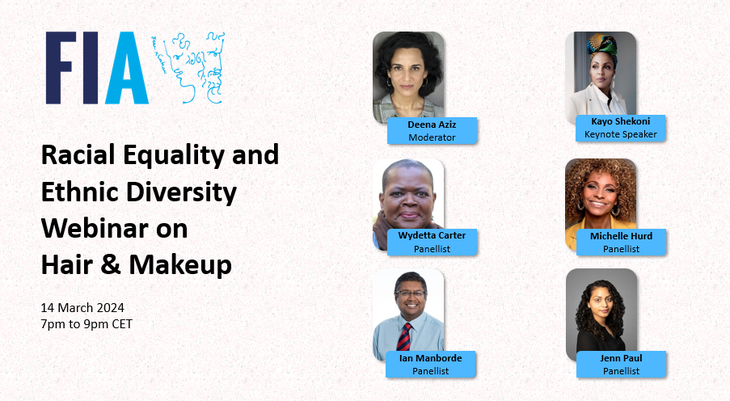The Executive Committee of FIA recently met in Istanbul, Turkey, on September 29 and 30, 2023. The meeting was attended by over 60 delegates from 21 unions representing performers in 16 countries.
Following the completion of the federation’s statutory business, delegates engaged in discussions and shared best practices on various challenges confronting performer unions globally, in their resolve to promote the highest standards and enhance terms and conditions for their members. A central focus was generative artificial intelligence (genAI), which has gained widespread attention since the 2022 meeting of the FIA EC, sparking existential concerns about the unrestricted use of these technologies. GenAI is trained on extensive databases, including protected performances as well as the facial features, voices, likenesses, and other personal attributes of performers—essential assets for building their careers and reputations. Of particular concern was the fact that much of this activity is currently undertaken without the performers’ knowledge, let alone their informed consent and compensation. Additionally worrisome is the increasing affordability and sophistication of these technologies, capable of creating nearly identical clones or synthetic performances when trained on specific datasets. This poses a risk as performers may have to contend with virtual copies of themselves or others, potentially missing out on future job opportunities. Delegates identified a heightened risk of job displacement, especially in the voice-over and dubbing sector, despite the rapid deployment of these technologies also in audiovisual content production. Performers worldwide are facing increasing pressure to relinquish their biometric and personal data rights without the ability to control how their image, voice, and likeness will be used, often for a merely symbolic compensation. Without informed consent, performers find themselves associated with products, services, or content in ways they never intended, which potentially causes them significant reputational harm and income loss. Compounding this issue is the lack of consumer awareness around “deep fakes” and the transformative use of AI, which, even when previously authorized, can mislead people into believing that what they are experiencing is real, with potential detrimental consequences for the performers involved.
The FIA EC emphasized the critical importance of informed consent, fair compensation, transparency, and control both in the input and output aspects of AI, urging FIA affiliates to advocate for regulatory changes to properly address the protection of personal and non-personal data in the context of generative AI, in addition to establishing industry-specific best practices through collective bargaining. The FIA EC adopted a toolkit aimed at raising awareness among FIA members regarding the threats associated with the unregulated use of AI and unanimously passed a resolution outlining FIA’s fundamental principles for a fair and equitable rollout of these technologies.
Three dynamic panel discussions delved into the topics of self-taping, intimacy direction, and emerging areas of organizing. These sessions drew upon practical examples from FIA affiliates that boast considerable expertise in these domains.
The surge in self-taping practices, which escalated during the pandemic, has persisted, prompting concerns about equitable access to casting opportunities, mental health implications, burdensome requirements imposed on aspiring performers, access to affordable technology, generational skills discrimination, and the excessive use of non-disclosure agreements, among other considerations. Acknowledging these concerns, several unions have worked hard to develop guidelines and agreements establishing an acceptable framework for self-taping. Collaboration with casting directors and agents is often integral to framing these practices in a manner that aligns with the needs and well-being of performers.
Intimacy direction is a fast-developing professional practice both in live theatre and recorded media productions focusing on choreographing and guiding scenes involving intimate or hyper exposed content. The primary purpose of intimacy direction is to create a safe and respectful environment for performers while ensuring the authenticity and effectiveness of the performance. IN recent years, the #MeToo movement and increased awareness of the importance of consent and respectful workplace environments have highlighted the need for formalized practices like intimacy direction. Professional intimacy directors work to create an environment where actors can explore and express intimate moments in a way that serves the narrative while prioritizing the well-being of everyone involved. Numerous FIA unions have taken proactive measures to champion intimacy coordination within the industry. Their efforts include the development of comprehensive guidelines, the raising of awareness within the performer community, establishing registries encompassing existing training programs and qualified intimacy professionals, and securing the engagement of intimacy coordinators in collective bargaining agreements. FIA is strongly committed to promoting the use of intimacy directors. After surveying the membership, it has set out to collect good practices and make a toolkit available to all members wishing to get acquainted with their line of work, certification requirements and their training, and to promote their widest use possible, not only to assist with hyper exposed and simulated sex scenes, but equally to help performers handle other emotionally and/or culturally sensitive performances that may make they feel uncomfortable.
The final panel discussion of the FIA Executive Committee cantered on new organizing avenues. Various members outlined strategies and priorities aimed at broadening union coverage to encompass potential new members or emerging lines of work. The discussion delved into extending coverage to influencers, deaf and disabled performers, escape room professionals, and drag artists, among others. Best practices included agreements specifically tailored to align with the unique professional needs of these groups, accompanied by proactive strategies to engage these professionals in union activities, cultivate their activism, and establish dynamic spaces for them to voice their specific concerns. The discussion also extended to language groups that had not previously been addressed by some of these unions.
A significant segment of the FIA Executive Committee meeting also revolved around significant labor disputes, including the ongoing SAG-AFTRA film/theatrical/streaming strike in the US, the prolonged ACTRA commercials lockout in Canada, and the impending industrial labor dispute in Turkey where many dubbing artists are struggling below the poverty line. In response, the FIA Executive Committee unanimously passed three resolutions. These resolutions call upon its members to remain vigilant and supportive, particularly in addressing any attempts by the relevant companies or agencies to hire foreign talent as a means of sidestepping the meaningful resistance put forth by these unions. An additional resolution also pledged the full support of all FIA affiliates to UDA, Canada, in the event of a possible future industrial action warranted against commercials agencies in Quebec.
A final half-day roundtable discussion saw prominent FIA affiliates meet with several hundred members of the Turkish Actors’ Union to talk about the socio-economic status of professional artists, the intellectual property rights of performers and the work of unions to extract maximum value from them as well as the importance of organizing, union activism and collective bargaining.
In a concluding half-day roundtable discussion, prominent FIA affiliates engaged with several hundred members of the Turkish Actors’ Union to share their experience and discuss the socio-economic status of professional artists, including their intellectual property rights, as well as about organising, union activism, and collective bargaining.
The FIA Executive Committee will next meet in New Zealand in the fall of 2024.
________________________________________________________________
All resolutions adopted at the FIA EC 2022 are available hereunder in French, English and Spanish.
All the pictures of the event are available for download on the FIA Flickr Account by clicking here.
FIA EC Istanbul 2023 – Resolution in support of the SAG-AFTRA strike_EN
FIA EC Istanbul 2023 – Resolution in support of the SAG-AFTRA strike_FR
FIA EC Istanbul 2023 – Resolution in support of the SAG-AFTRA strike_ES
FIA EC Istanbul 2023 – Resolution in support of ACTRA and against the commercials lockout_EN
FIA EC Istanbul 2023 – Resolution in support of ACTRA and against the commercials lockout_FR
FIA EC Istanbul 2023 – Resolution in support of ACTRA and against the commercials lockout_ES
FIA EC Istanbul 2023 – Resolution in support of dubbing artists in Turkey_EN
FIA EC Istanbul 2023 – Resolution in support of dubbing artists in Turkey_FR
FIA EC Istanbul 2023 – Resolution in support of dubbing artists in Turkey_ES
FIA EC Istanbul 2023 – Resolution in support of UDA, Canada_EN
FIA EC Istanbul 2023 – Resolution in support of UDA, Canada_FR
FIA EC Istanbul 2023 – Resolution in support of UDA, Canada_ES
FIA EC Istanbul 2023 – Resolution on Artificial Intelligence_EN
FIA EC Istanbul 2023 – Resolution on Artificial Intelligence_FR
FIA EC Istanbul 2023 – Resolution on Artificial Intelligence_ES





